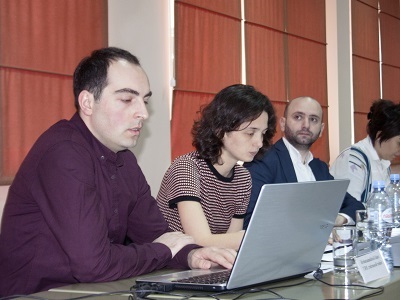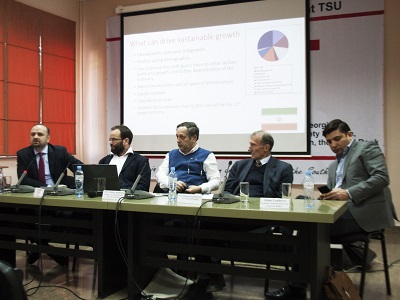ISET Hosts a Workshop to Track the Impact of EU Efforts to Support Georgia’s Agricultural Cooperatives
- Details

Facilitating cooperation among Georgia’s smallholders is in the focus of EU’s 52 mln Euro ENPARD project, of which ISET is a (small) part. An evaluation effort, coordinated by the ISET Policy Institute, has uncovered some interesting facts and figures.
Implemented by four NGO coalitions since January 2014, in its first year ENPARD supported 82 coops, including 738 members (36% of whom are females).
- Females are best represented in chicken and potato cooperatives. Not surprisingly, there are NO women in machinery groups.
- While as a rule ENPARD-supported farmer groups are very small (less than 10 members on average), the largest coop consists of 31 members who are in the business of beekeeping and honey (apiculture)! The smallest (4 members) is in winemaking.
Will Georgia Become a Bridge between Europe and Iran?
- Details

The recent resetting of Georgian-Iranian bilateral relations was in the focus of a seminar organized by ISET and the Austrian Institute for Caucasus Studies as part of the Vienna Forum for the Modernization of the Black Sea Region. Held on Tuesday, March 22nd, the seminar covered both historical and current – political and economic – aspects of cooperation between the two countries. The expert panel included Professor Hans-Georg Heinrich, Austrian Institute for Caucasus Studies; Prof. George Sanikidze, Director of the Institute of Oriental Studies at Ilia State University; Iva Khokhlov, Ernst & Young-Georgia; and ISET President Eric Livny, who also moderated the discussion.
Speakers focused on the opportunities related to Georgia’s reopening towards Iran’s investment and tourism. Georgia can offer Iran several important advantages: easier access to the EU market and infrastructure connecting Iran to the Black Sea region: sea ports, rail and road, pipelines and fiber optic. Georgia should certainly expect a sharp increase in the number of Iranian tourists following the lifting of the visa requirement for Iranian visitors. Whether or not this would be followed by foreign direct investment from Iran will depend on the quality of Georgia’s business environment, its openness to qualified Iranian labor, and access to agricultural land.










